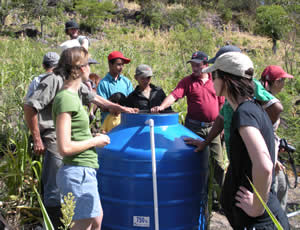The "field methods" courses in the ESM curriculum are designed to provide students with practical field experience. The focus is on training on methods, techniques and skills that could be used in doing field experimentation or work rather than the theoretical approach that is taken by many other courses in our curriculum.
This course will focus on the installation of small scale electical power generation that is coupled to the use of instrumentation or irrigation. These technologies and skills are very useful for watershed restoration, agriculture, and environmental remediation.
General Learning Objectives:
The
main skills and techniques presented in this class are:
- wiring an electric circuit
- setting up a solar PV panel
- designing and sizing the components of a water pumping system
- matching pumps to solar panel
- evaluating the feasibility of solar-water pumping installations and suggesting alternative designs
- cultural and social dimensions of community water projects
- creating a project design with a mock-up for demonstration
- financing small solar projects
- measuring compent and whole-system performance
- assessing the overal impact of the entire project
Assignments and Grading:
There will be a simple assignment due each week worth 5 points.
On the final day your group will present your project:
- with this rubric
(25 points at 5 points each)
- clear background and problem statement that would be motivational to your peers in the class
- project design with diagrams and details
- parts list and implementation issues
- overall impact including how you would judge if the project is successful
- evaluation of your project compared to other options
Each student will write a short paper
- with the following rubric
worth 15 points
- turned in with a week of the final presentation (5 points)
- short written evaluation of your project
- description of the next steps you could take to implement this project
Sickness and closure Policies:
Because this course consists of a series of workshops, it is very difficult to make up absence due to sickness or unavoidable emergencies. We will provide some alternative exercises. Please do not attend class if you are sick or bring sick children.
If Portland State or the laboratory is closed for some reason, please see this website for instructions. If the university is closed and the website is down, enjoy yourself and check back later.
Student conduct:
Workshop activities will be highly collaborative. Students need to conduct themselves in a professional manner during these sessions.
All written work must be created by the student. Any use of references or other student's work (such as graphics) must be attributed. When in doubt - attribute.
We will adhere to the student conduct code as published in the PSU Bulletin.
|



![]()